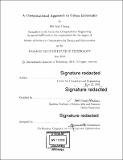A computational approach to urban economics
Author(s)
Chong, Shi Kai.
Download1103712608-MIT.pdf (8.168Mb)
Other Contributors
Massachusetts Institute of Technology. Computation for Design and Optimization Program.
Advisor
Alex (Sandy) Pentland.
Terms of use
Metadata
Show full item recordAbstract
Cities are home to more than half of the world population today and urbanization is one of this century's biggest drivers of global economic growth. The dynamics of the urban environment is thus an important question to investigate. In this thesis, techniques from statistical modeling, machine learning, data mining and econometrics are utilized to study digital traces of people's everyday lives. In particular, we investigated how people influence the economic growth of cities, as well as how the urban environment affect the decisions made by people. Focusing on the role of cities as centers of consumption, we found that a gravity model based on the availability of a large and diverse pool of amenities accurately explained human flows observed from credit card records. Investigation of the consumption patterns of individuals in Istanbul, Beijing and various metropolitan areas in the United States revealed a positive relationship between the diversity of urban amenities consumed and the city's economic growth. Taking the perspective of cities as hubs for information exchange, we modeled the interactions between individuals in the cities of Beijing and Istanbul using records of their home and work locations and demonstrated how cities which facilitate the mixing of diverse human capital are crucial to the flow of new ideas across communities and their productivity. This contributes to the body of evidence which supports the notion that efficient information exchange is the key factor that drives innovation. To investigate how urban environments shape people's decisions, we study the social influence city dwellers have on each other and showed how face-to-face interaction and information exchange across different residential communities can shape their behavior and increase the similarity of their financial habits and political views in Istanbul.
Description
Thesis: S.M., Massachusetts Institute of Technology, Computation for Design and Optimization Program, 2018 Cataloged from PDF version of thesis. Includes bibliographical references (pages 89-92).
Date issued
2018Department
Massachusetts Institute of Technology. Computation for Design and Optimization ProgramPublisher
Massachusetts Institute of Technology
Keywords
Computation for Design and Optimization Program.